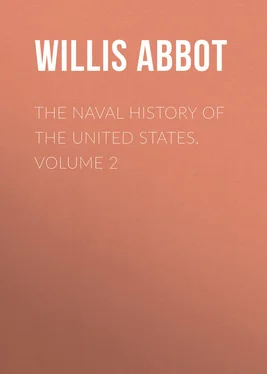Willis Abbot - The Naval History of the United States. Volume 2
Здесь есть возможность читать онлайн «Willis Abbot - The Naval History of the United States. Volume 2» — ознакомительный отрывок электронной книги совершенно бесплатно, а после прочтения отрывка купить полную версию. В некоторых случаях можно слушать аудио, скачать через торрент в формате fb2 и присутствует краткое содержание. Жанр: foreign_antique, foreign_prose, Историческая проза, на английском языке. Описание произведения, (предисловие) а так же отзывы посетителей доступны на портале библиотеки ЛибКат.
- Название:The Naval History of the United States. Volume 2
- Автор:
- Жанр:
- Год:неизвестен
- ISBN:нет данных
- Рейтинг книги:5 / 5. Голосов: 1
-
Избранное:Добавить в избранное
- Отзывы:
-
Ваша оценка:
- 100
- 1
- 2
- 3
- 4
- 5
The Naval History of the United States. Volume 2: краткое содержание, описание и аннотация
Предлагаем к чтению аннотацию, описание, краткое содержание или предисловие (зависит от того, что написал сам автор книги «The Naval History of the United States. Volume 2»). Если вы не нашли необходимую информацию о книге — напишите в комментариях, мы постараемся отыскать её.
The Naval History of the United States. Volume 2 — читать онлайн ознакомительный отрывок
Ниже представлен текст книги, разбитый по страницам. Система сохранения места последней прочитанной страницы, позволяет с удобством читать онлайн бесплатно книгу «The Naval History of the United States. Volume 2», без необходимости каждый раз заново искать на чём Вы остановились. Поставьте закладку, и сможете в любой момент перейти на страницу, на которой закончили чтение.
Интервал:
Закладка:
But, if the invaders are rightly to be blamed for the useless vandalism they encouraged, the American authorities are still more culpable for their neglect of the most ordinary precautions of war. That a national capital, close to the sea, should be left virtually unprotected while the enemy was massing his forces only a few miles away, seems almost unbelievable. But so it was with Washington; for five hundred flotilla men were forced to bear the brunt of the attack of five thousand British. True it is that the military authorities had massed seven thousand militia-men for the defence of the city; but such was the trepidation of these untrained soldiers, that they fled before the main body of the British had come into the fight. That the sailors and marines fought bravely, we have the testimony of the British themselves. Mr. Gleig, a subaltern in the attacking army, writes, "Of the sailors, however, it would be injustice not to speak in the terms which their conduct merits. They were employed as gunners; and not only did they serve their guns with a quickness and precision which astonished their assailants, but they stood till some of them were actually bayonneted with fuses in their hands; nor was it till their leader was wounded and taken, and they saw themselves deserted on all sides by the soldiers, that they quitted the field." Therefore, in the battle of Bladensburg, the blue-jackets won nothing but honor, though the results of the battle were so mortifying to the national pride of the people of the United States.
On the 25th of August the British left the smoking ruins of Washington behind them, and made for their fleet lying in the Patuxent. They feared that the outraged nation would rise upon them, and turn their march into a bloody retreat, like that of the British soldiery from the historic field of Lexington. Accordingly their departure was by night, immediately after a furious storm of rain and wind. Strict orders were issued to all the Americans in Washington, warning them, under penalty of death, not to leave their houses until the sun rose the next morning. Then the British stealthily marched out of the town. "No man spoke above his breath," says subaltern Gleig. "Our very steps were planted lightly, and we cleared the town without exciting observation." A two days' march brought them to Benedict, where the fleet lay in waiting for their reception.
In the mean time, a portion of the British fleet had ascended the Potomac as far as Alexandria, and, finding that town defenceless, proceeded to dictate to the inhabitants the terms upon which they could save their village from desolation. The British demanded that all naval stores and ordnance, all the shipping and its furniture, all merchandise, and all provisions in the town should be surrendered. Several vessels had been scuttled, to prevent their falling into the hands of the enemy; these, the British demanded, should be raised, repaired, and delivered to them Time, however, did not permit the fulfilment of this condition; but to the others, harsh and humiliating though they were, the inhabitants were forced to accede. Heavy laden with the spoils of the village, the pillagers weighed anchor and started down the Potomac. But they were not destined to carry away their booty unmolested. News of the expedition reached Baltimore, and a large party of the sailors at the navy-yard were sent to the banks of the Potomac to cut off the enemy's retreat. They were officered by four men famous in American naval annals, – Perry, Rodgers, Porter, and Creighton. At Indian Head, just below Mount Vernon, the Potomac River narrows and flows swiftly between densely wooded bluffs. At this point the Americans threw up redoubts, and, mounting all the cannon that could be gathered on such short notice, prepared to dispute the enemy's passage. When the British fleet hove in sight, they were greeted with a storm of shot from the unsuspected batteries; and they recoiled in confusion. Practised American hunters lined the woody shores, and picked off the British sailors with musket-balls. For some time the fleet was thus checked in its progress. Finally the admiral determined that only by a bold dash could he escape; and accordingly, massing his vessels and concentrating his fire on the chief battery, he dashed past, and rejoined his superior officer, Cockburn, not without paying dearly for his exploit at Alexandria.
While the British were thus devastating the shores of Chesapeake Bay, they cast more than one longing look toward the thriving city of Baltimore, which, by its violent patriotism, had done much to urge on the war. From the shipyards of Baltimore came more than one stout naval vessel that had forced the enemy to haul down his colors. But that which more than any thing else aroused the hatred of the British was the share Baltimore took in fitting out and manning those swift privateers, concerning whose depredations upon British commerce we shall have something to say in a later chapter. "It is a doomed town," said Vice-admiral Warren. "The truculent inhabitants of Baltimore must be tamed with the weapons which shook the wooden turrets of Copenhagen," cried the editor of a great London paper. But, nevertheless, Baltimore did not fall before the invader, although for some time the army and navy of the enemy were united in the attempt to bring desolation upon the obnoxious city.
After the fall of Washington, the depredations of the British along the shores of Chesapeake Bay redoubled, and the marauding expeditions thus employed were really feelers thrown out to test the strength of the defenses of Baltimore. That the marauders found some opposition, is evident from a passage in the journal of a British officer. "But these hasty excursions, though generally successful, were not always performed without loss to the invaders." On one of these expeditions, Sir Peter Parker, captain of the frigate "Menelaus," lost his life. He had been ordered down to the mouth of the bay just after the fall of Washington. "I must first have a frolic with the Yankees," said he. And accordingly, after a jovial dinner aboard his frigate, he led a night expedition of sailors and marines ashore, expecting to surprise a small body of Maryland militia stationed at Moorfields. Sir Peter's frolic turned out disastrously; for the Marylanders were on the watch, and received the invaders with a fierce volley. Sir Peter was gallantly cheering on his men, when a musket-ball cut the main artery in his thigh. "They have hit me, Pearce," he said faintly to his lieutenant; "but it's nothing. Push on, my brave boys, and follow me." But even thus cheering, he fell back, the words died away in his throat, and he bled to death before a surgeon could be found. It is but right to say, that, though he sailed in Cockburn's command, he had none of the cruel brutality which his admiral too often showed.
On the 12th of September a more serious assault was made upon Baltimore. The British naval and military forces united in the attack, which was made by land and sea. A force of nine thousand men, including two thousand marines and two thousand sailors, was landed fifteen miles from Baltimore, and under the command of Gen. Ross and Admiral Cockburn marched gayly inland, never doubting that they would find the Americans unprepared, and repeat their exploits at Washington. In this expectation they were sadly disappointed; for the Maryland militia, aided by a few regulars and seamen, outfought the British at every point, and checked their farther advance. Among the slain was Gen. Ross, who was shot down as he was leading the advance of the British skirmishers. In the mean time, the British fleet had been taking its share in the engagement by attempting to reduce Fort McHenry. A large flotilla of frigates, schooners, sloops, and bomb-ketches entered the Patapsco River on the morning of the 12th, and, casting anchor out of the reach of the fort's guns, opened a furious fire. The fort was manned by militia-men and a large detachment of the gallant sailors from Barney's flotilla. When the continual falling of shells within the fort told that the enemy had come within range, the guns of Fort McHenry opened in response. But, to the intense chagrin of the Americans, it was found that their works mounted not a single gun that would carry to the enemy's fleet. There then remained to the garrison only the trying duty of holding their post, and enduring without response a galling fire from the enemy. All the garrison stood to the guns without flinching; while the shrieking shells fell on all sides, and, exploding, scattered deadly missiles in all directions. One shell struck and dismounted one of the twenty-four-pounders, killing and wounding several of its men. Admiral Cochrane, who commanded the attacking fleet, saw this incident, and ordered three of his bomb-vessels to move up nearer to the fort. This gave the Americans the opportunity for which they had been longing, and instantly every gun in the fort opened upon the three luckless ketches. Half an hour of this fire sufficed to drive the three vessels back to their original station.
Читать дальшеИнтервал:
Закладка:
Похожие книги на «The Naval History of the United States. Volume 2»
Представляем Вашему вниманию похожие книги на «The Naval History of the United States. Volume 2» списком для выбора. Мы отобрали схожую по названию и смыслу литературу в надежде предоставить читателям больше вариантов отыскать новые, интересные, ещё непрочитанные произведения.
Обсуждение, отзывы о книге «The Naval History of the United States. Volume 2» и просто собственные мнения читателей. Оставьте ваши комментарии, напишите, что Вы думаете о произведении, его смысле или главных героях. Укажите что конкретно понравилось, а что нет, и почему Вы так считаете.











![Hubert Bancroft - The Native Races [of the Pacific states], Volume 5, Primitive History](/books/749157/hubert-bancroft-the-native-races-of-the-pacific-s-thumb.webp)
![Hubert Bancroft - The Native Races [of the Pacific states], Volume 1, Wild Tribes](/books/750126/hubert-bancroft-the-native-races-of-the-pacific-s-thumb.webp)